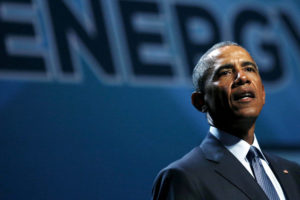Coming under great pressure from the right and left, President Obama last week held a Joint Session of Congress to unveil his plan to get America back to work and the economy growing – The American Jobs Act. The announcement came the same week that Lehman Brothers failed three years ago and virtually collapsed the entire financial system triggering a global economic downturn. Undoubtedly, critics (including me) are wondering where this plan was during Mr. Obama’s first 100 days in office, but clearly he had other priorities.
I received a copy of the plan on Wednesday and after a thorough review it left me feeling unimpressed. First, I must applaud Mr. Obama simply for the effort that went into coming up with “something” and placing it on the table. However, the plan that he has developed reveals a President that is clearly out of his element, and attached to unsustainable solutions – spending increases along with temporary and targeted tax cuts. Obama has a flawed belief that by pulling this or that policy lever, by extending this program or cutting that tax for a year, the Administration can stimulate the $15 trillion U.S. economy to grow.
The President’s plan will expand the payroll tax cut passed last year – providing a $1,500 tax cut to the typical American family – and costing the Treasury about $115 billion. These cuts have largely failed to stimulate demand because most Americans are using the extra cash to deleverage and pay off debt, so extending the tax cut would likely fail to have an impact on private sector job creation. As stimulus goes, it makes much more sense to incentivize workers to work by cutting the payroll tax than paying people for not working by extending unemployment benefits again.
Mr. Obama hopes to cut the payroll tax in half for 98% of businesses, while providing a payroll tax holiday for added workers. Both measures are decent policy proposals during a normal economic recovery, but there is nothing normal about this recovery. Companies are not expanding payrolls because new regulations are creating uncertainty, hiring costs are rising, and generally there is a lack of demand to justify more production. Employer payroll tax cuts will not address those issues. Furthermore, the tax cut is temporary; employers are not likely to add workers based on lower tax costs if they know those costs are going to rise in a year. Most companies will pocket the tax cut to build cash reserves or possibly make capital investments.
These temporary tax cuts will show up as a temporary blip in consumer spending and GDP, but they will not change incentives to work, consume or invest and promote long-term growth. Other ideas put forth by the President include – extending accelerated depreciation into 2012 and regulatory reductions for start-up companies – both are good recommendations and should be implemented.
Obama called on Congress to provide hiring tax credits for veterans and long-term unemployed workers. Both are noble goals, but Obama fails to understand that temporary measures never create sustainable outcomes. Moreover, this Administration is seemingly obsessed with picking winners and losers. Employers will hire the best and brightest talent for an available position based on need, so targeted incentives do very little to create jobs. Resources allocated for these tax credits would go farther if utilized to create a comprehensive job training program, and then veteran and unemployed workers would have an option to acquire the required experience to fill open skilled labor positions.
In 2009, the President warned the country about deteriorating roads, failing bridges, and obsolescent schools. Congress passed the American Recovery and Reinvestment Act and appropriated $787.5 billion for fiscal stimulus, but the Democrats in Congress only allocated 5% of the bill to infrastructural spending. Now, the President is back center stage, and sounding the alarm that our bridges and schools are falling down – more “shovel-ready” projects.
Obama’s jobs plan call for the modernization of 35,000 schools across America and the creation of a bipartisan National Infrastructure Bank. No one can deny that America is long overdue on making investments to strengthen the country’s network of roads, bridges, highways, waterways, airports, and nuclear facilities. However, the historical track record of GSE’s or government sponsored-enterprises are peppered with unintended consequences, does anyone recall Fannie Mae and Freddie Mac. Not to mention, other countries that have experimented with infrastructure banks have discovered they are rife with corruption, overspending, and crony capitalism.
Exploring the use of public-private-partnerships or P3’s would be a far better approach. For example, a private developer could acquire land and build an elementary school, and then lease that school to the local school system. That would reduce costs to the taxpayers and mitigate risks associated with land acquisition, development, and building construction. Other examples might include a private investment company taking over an airport, implementing a capital improvement plan, and then reselling the facility back to the public.
The largest disappointment was Obama’s failure to develop a method to pay for his $400 billion misguided jobs bill. In true Obama form, the President delegated the nasty job of wading in the legislative details to Congress, he instructed the Joint Deficit Reduction Committee to find additional cuts to pay for the plan.
After passing a plethora of bills that have failed the American people – $787.5 billion stimulus bill, $3 billion for “cash for clunkers”, “cash for caulkers”, credit card price controls, Detroit bailouts, Build America Bonds, jobless benefits for a record 99 weeks, ObamaCare, and Dodd-Frank. Mr. Obama himself still fails to clearly understand the role of the President is to lead and not follow on policymaking. Is it time for “change”?
To grow the economy and restart private sector hiring, the President should focus on a major overhaul of the tax code, and reforms should be broad-based, immediate, and permanent. Obama will have to take on the uncomfortable task of reforming entitlement programs – Social Security, Medicare, and Medicaid. The Administration should complete a honest appraisal of every government agency – Department of Justice, Energy, Transportation, Commerce, and the list goes on – reforming those with high scores of ineffectiveness. Congress will need to make significant reforms to regulations – Sarbanes-Oxley immediately comes to mind. Lastly, the President must demand that we place education at the front and center of any jobs program, improving our k-12 system nationally will provide future generations with a higher quality education – and that means more options to be a positive contributor to the success of America.




